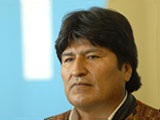The Bolivia-US divorce
By Eliot Brockner for ISN
The 1 November expulsion of the Drug Enforcement Administration (DEA) from Bolivia was a drastic turning point in souring US-Bolivian relations. Over the last few months, Washington and La Paz have been trading tit-for-tat attacks on a fragile bond that has quietly deteriorated as fast as any relationship the US has in the region.
The impact on Bolivian President Evo Morales' order will be felt almost immediately in the ongoing war on drugs. History suggests that the DEA's inability to operate in Bolivia will make the nation more susceptible to the increased presence of international drug smugglers. It is worth noting that since Venezuela expelled the DEA in 2005, the UN has listed that nation as the main source of all cocaine consumed in the European Union.
Bolivia is the world's third largest producer of coca, and is one of the most favorable growing environments. In his book on a crime network between Mexico, Brazil and Colombia, author Juan Carlos Garzón external pageimpliescall_made that international smugglers increasingly try to gain control of the source of production. Garzon argues that there are already Mexican cartels (which account for external page70 percentcall_made of the cocaine consumed in the United States, according to US officials) operating in Bolivia. A 2007 external pageagreementcall_madebetween Mexico and Bolivia allowing for mutual extradition of criminals suggests that both nations are keenly aware of the situation.
The unpopular war on coca cultivation has won few supporters in Bolivia, especially in the more mountainous coca-growing regions, and also where communities make up the base of Morales' constituency. The absence of the DEA, whose primary goal has been coca eradication, may lead to more coca production, which could in turn lead to more interest from cartels looking to control supply.
However, as the door closes on the DEA, it opens for her neighbors.
Within two weeks of the DEA's expulsion from Bolivia, Brazil and Bolivia external pageannouncedcall_made they would form a strategic alliance to combat the war on drugs effective 1 January 2009. One of the highlights of the treaty, which for now merely lays the groundwork for future multi-lateral external pagecooperationcall_made, is the emphasis on each nation's individual sovereignty - a hot issue in South America since the March killing on Ecuadorian soil of Raul Reyes, the commander of FARC. Some saw this as an indirect attack from US military leaders who provide the Colombian military with millions of dollars in technology and intelligence. An alliance with Brazil is in many ways politically less risky.
According to local news sources, Bolivian Minister of Government Alfredo Rada hopes that the bilateral agreement will ultimately include other members of external pageMERCOSURcall_made to work in their collective self-interest to combat drug smuggling.
If the lack of consensus reached during the May summit of external pageUNASURcall_made in Brasilia is any indication, real multinational integration is years away. However, while there will be bumps in the road toward regional integration, La Paz's turn to Brasilia is a clear sign of Brazil's emergence as a regional political leader.
Sensing Brazil's importance in Latin America and the pending need for increased cooperation between the two nations, US President-elect Barack Obama announced on 11 November that he planned to external pagevisit Brazilcall_made as soon as possible.
The DEA's presence will not disappear overnight, and there is much to gain from an alliance between US and local intelligence sources. In the absence of such cooperation, Mexican cartels, the primary importers of illegal drugs to the US, will be able to spread their tentacles even deeper into the heartland of production.
Wanted men who have already been external pageworking in Boliviacall_made, such as Sinaloa Cartel operative external pageJuan Jose Esparragoza-Morenocall_made, may be able to extend their connections and knowledge with greater impunity, as controls are sure to loosen in the transitional phase.
Bolivia has claimed that it still needs the US' external pagehelp,call_made and Morales has expressed interest in external pageengagingcall_made the new US president. Both are signs that US presence is not gone forever. But part of this may be political.
The former Latin America bureau chief of a major US daily recently told ISN Security Watch that in spite of the Bolivian president's popularity, most of his constituents do not agree with the actions he has recently taken toward the US. The external pageseizurecall_made of 100 kilos of cocaine by Bolivian authorities in Santa Cruz on 19 November will help silence some critics.
Bolivia remains an important nation for Washington's war on drugs, and the US will likely look for new opportunities to resume ground and intelligence operations there. What may emerge is not the traditional US-dominant paradigm that has existed for decades, but rather an alliance of equal partners spearheaded by Brazil and the US to combat drug smuggling in the region.

